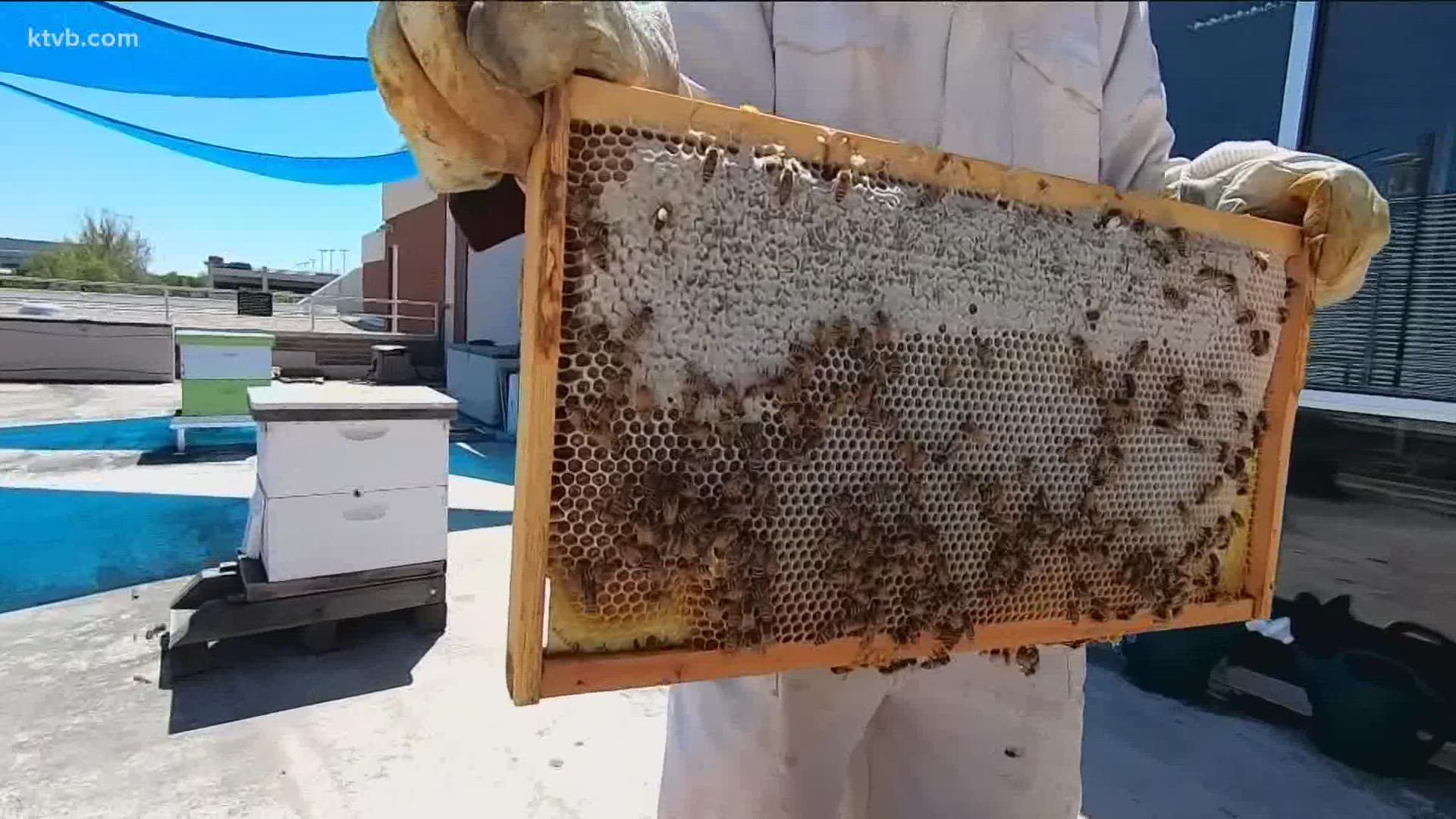BOISE, Idaho —
We see them all the time, but we often do not pay much attention. However, honeybees are essential to the world's food supply, and in recent years, their numbers have been dropping. So what can we do to help the bees?
Boise State University campus is a beehive of activity, but not usually on the roof of one of the buildings.
With warmer weather, that means bees and other pollinators are becoming very active. On the roof of the student union building at Boise State, members of the Bee Team are doing their bi-weekly inspection of their beehives.
"We try to do it every two weeks, sometimes more, sometimes less. And what we're looking for is the overall growth of the hive," said Brooke Zander a member of the Bee Team.
The BSU Bee Team make sure the bees are strong and health, keeping them as busy as, well, bees.
"So honey production, egg production, overall hive health, population, and obviously if there are any yellow jackets or killer mites, anything that could be harmful to our bees, like other predators or bugs trying to make their territory our bee territory is not good,” Zander said. “So just the overall health and trying to help them out as much as we can."
Honeybees play an essential role in our food production. It is estimated that one out of every three bites of food that we eat is the direct result of honeybees, which are the main pollinators for most of our food crops. and while the honey they produce is their main food source, it is a sweet reward for the rest of us.
"Well, we have found a lot of great honey production," Zander said. "So a lot of honeycomb build-up which is honestly really beneficial. Let's us know they are healthy, they're actually making honey."
Man-made beehives, like those boxes in backyards and fields throughout Idaho, contain ten frames on which the bees build their honeycombs to store honey and house the eggs for future bees.
Bees travel several miles a day, gathering nectar from all kinds of blossoms. As they do so, pollen in the flowers sticks to their fuzzy bodies, and is transferred to other flowers that they visit, completing the process of pollination. Without it, plants could not produce the food that we eat.
The inside of the hive is a very busy place, with tens of thousands of bees buzzing around.
"It's really hard to say an exact number, but it's good to see that the numbers are growing,” Zander said.
There are three types of bees in the hive: the queen, of which there is only one, she lays all the eggs and can live up to five years; worker bees, who make up most of the bees in the hive, they are all females, and they do just about everything in the hive, from nursing the young, to foraging for nectar, to cleaning and defending the hive; drones are the male bees, and there are usually only a few hundred of them in the hive, their only role is to repopulate the hive.
Workers and drones have a life span of only about six to eight weeks, but new bees are constantly being produced to replace them.
"They don't need much intervention from us. But we'll obviously help in any way we can," Zander said.
One way that the bee team helps is to provide additional habitat as the colony grows. Such as providing another hive box, providing more space and more frames for honey production.
"And so already we are at 70 percent of capacity right now. That's why we're adding another box. And now we'll have three instead of two," Zander said.
The bee team gathers the honey and beeswax from the hives and makes various products which they sell in the BSU bookstore: delicious honey, as well as things like lip balm and hand salve.
“All the proceeds from that just helps keep our hives healthy and now we can add more hives if we need to," Zander said.
There are ways that you can help the honeybees in your own backyard, like planting some of the things that attract them.
The bee team does what they can to help people understand the importance of bees, and to not be afraid of them.
“I know some people are still fearful, and some people have allergies, and they certainly don't understand a lot about the species, and most people see bees as pests,” Zander said. “But I feel like by posting to social media and just trying to do outreach like this is really important."
It is not unusual to run across a bee swarm this time of year. If you do happen to find a swarm of bees, don't panic, they are not out to hurt you. They are just looking for a new home.
You can contact the treasure valley beekeepers club, and they will be happy to come and gather the bees safely. They can also help you learn more about raising honeybees and establishing your own backyard hives.
Watch more You Can Grow It:
See them all in our YouTube playlist here:

